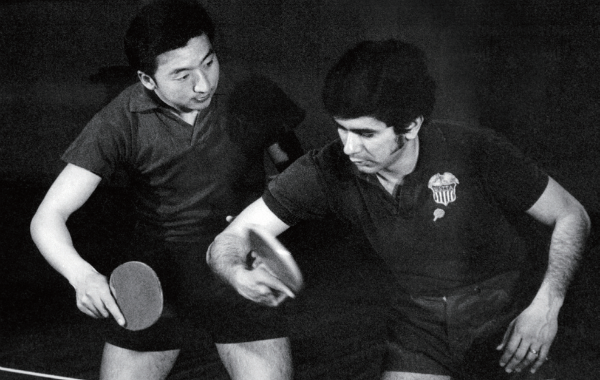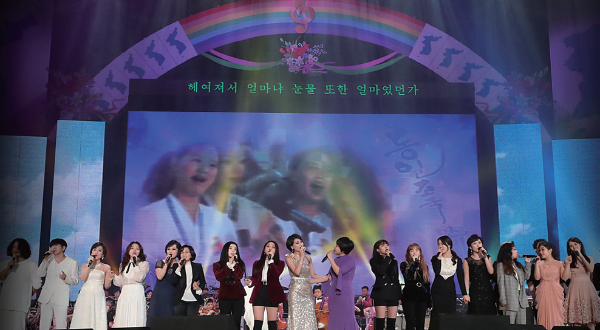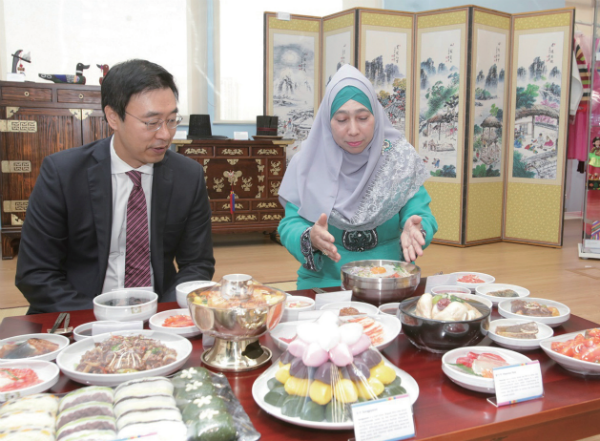After the 2018 PyeongChang Winter Olympics ended successfully, a warm breeze is now blowing on the Korean Peninsula. Last month, the South Korean artistic delegation visited and gave performances in Pyeongyang, the capital of North Korea. This suggests that a cultural medium like music can not only give the individual a feeling of joy, but have a positive influence on diplomatic situations, which can be referred to as “Cultural diplomacy.” The Sungkyun Times (SKT) now explains the concept and special ways for cultural diplomacy and analyzes the current policies for cultural diplomacy in South Korea.
What Is Cultural Diplomacy?
Concept of Cultural Diplomacy
Cultural diplomacy is a kind of public diplomatic strategy which uses, in a broad sense, culture as a tool for change. The main goal of this is to build a better understanding and a positive perspective toward cultural areas including a country, leading to the development of the state. In this way, it can help solve diplomatic conflicts between countries through cultural exchanges. Sports, movies, arts and education are usually used as a means for this. Rather than focusing on detailed, short-term political issues like negotiation for the Free Trading Agreement (FTA), it targets on macroscopic, long-term issues, which aims to “improve the public image of a nation and its relationship with other countries.” As a result, the possibility of cooperation among other nations has increased based on a better understanding, changing the politic relations between countries favorably and helping to prevent future conflicts. Moreover, as the domestic tourism of foreigners in each country can be promoted, a lot of tourism revenue can be created as well.
History of Cultural Diplomacy
Through cultural diplomacy, the world has already maintained positive relationships among the marginal countries for a long time. The early form of it started with pioneering trade routes such as the Silk Road. The Silk Road, an ancient trade route that crossed land and sea, connected the East and West. Religions, especially Christianity and Buddhism, and various artworks were conveyed to each side through it, which promoted cultural exchanges. In 2015, a new rail network between China and Spain called Yixinou, a descendant of the Silk Road, was opened to promote the cultural exchanges once again. South Korea also has conducted cultural diplomacy from the past. For instance, various cultural ambassadors were sent to Japan, China and Western countries.

In modern history, the most representative example of cultural diplomacy is perhaps the “Ping-pong diplomacy” between the United States (US) and China. It occurred in 1971, when the 31st World Table Tennis Championships was held in Nagoya, Japan. The US table tennis team who participated in the Championships (and some journalists) was invited to China for friendly matches. This was a surprising event because the cold war system was still ongoing at that time. Thanks to table tennis, China and the US could restart their political exchanges which had been on hold for almost 20 years.
Special Ways of Cultural Diplomacy
As infrastructure and communication has developed, it has become possible to conduct cultural diplomacy more frequently than before, regardless of time and location. Concerning their uniqueness and effectiveness, the following two ways have recently been gaining attention.
The Fulbright Program : An Exchange of Knowledge

The Fulbright Program is a method of cultural diplomacy in the US that uses education. It is an international exchange scholarship program, which allows professors, teachers, students or anyone concerned from other countries to study in the US. The program gives financial support in such fields as Humanities, Social science, Art, Engineering, Nursing and Pedagogy. It was initiated based on the Fulbright Act, which indicated that profits from selling farm surpluses of the US to other countries should be devoted to educational exchange plans with other countries.
The US has been able to achieve diplomatic goals both in individual and national dimensions through the Fulbright Program. Individuals who received benefits from the program are likely to think more positively about the US, which provided them with financial aid. Countries whose citizens were the beneficiaries can strengthen their competitiveness in research performance and human capital. Furthermore, the US can not only expand its educational influences but maintain amicable relationships with recipient countries. According to the US Department of State, 59 of the Fulbright alumni have received a Novel Prize and 82 have won the Pulitzer Prize. About 6,000 people get scholarships from the program every year, and South Korea has been involved since 1950. In fact, the program was nominated for a Nobel Prize for Peace itself in 2000, thanks to its potential for easing global conflicts.
Place Branding: Setting a National Trademark
Place branding, another strategy for cultural diplomacy, is to establish the identity of a certain place, which results in improving its value. It involves nation branding, region branding and city branding. It helps foreigners have a unique image of a certain place and take an affirmative attitude toward that place. Although it is often regarded as a means for marketing, it is also used to strengthen the influence of a place in the diplomatic area, which can be extended to the whole nation.
If one country succeeds in place branding, that place will get popularity and an affirmative image internationally. This will naturally lead to the reinforcement of cultural and economic influence of that place, allowing the country to exert stronger force in the fields of investment, tourism and international politics. For instance, New Zealand has conducted the campaign “100% Pure New Zealand” since 1999, which is based on the purity and reliability of its nature. The campaign is successfully utilized in most of the international public relations (PR) activities such as advertisement and online marketing. With this campaign, New Zealand had improved its public image as an eco-friendly country and earned large sums of tourism revenue. Similarly, Seoul, the capital of South Korea, is now trying to promulgate its slogan “I.SEOUL.U” to globalize itself.
Cultural Diplomacy of South Korea
Due to the importance of cultural diplomacy, South Korea is currently implementing some related policies toward North Korea and the entire world as well.
Sports and Music as an Icebreaker on the Korean Peninsula
Just as with the example of Ping-pong diplomacy, sport can be an effective means of cultural diplomacy. Sport is often used for soft diplomatic strategy since it is one of the most beloved cultures of all societies; it has also worked well on the Korean Peninsula. Being the only divided nation in the world, the South and the North Korea have conflicted for the past 10 years in terms of the North’s nuclear strategy, which caused a breakdown in their relationship. It was desirable, therefore, for South Korea to soften the atmosphere using sport, rather than adhere to take a direct and strict position against North Korea. Because sport emphasizes cooperation and competition, a strong sporting atmosphere can be created easily. In fact, both North and South Korea have tried to find a breakthrough for their long history of conflict via sports games. They have marched together in many international sports events including the Olympics, the Asian games, and the World Table Tennis Championships. At the 2018 PyeongChang Winter Olympics, they even formed a united team in women’s hockey and played together.

In addition, dispatching an artistic delegation has also been a helpful strategy to initiate communication and negotiation. Like diplomacy through using sports, it helps develop the relationship without mentioning any provocative matters directly. Music and dance, the main components of the delegation, are the most effective means which could have a positive influence even in a short period, thanks to their ripple effect. The exchange of artistic delegations were initiated in earnest after the 2018 PyeongChang Winter Olympics where North Korea sent their own cheering squad and orchestra along with their national sports team. Furthermore, the artistic delegation of South Korea, which included famous Korean pop singers, successfully ended their performances in Pyeongyang last month, with the slogan “Spring is Coming.” Watching the performances, Kim Jong-un, the supreme leader of North Korea, said that he looked forward to a musical delegation sent from North Korea holding the next performance named as “Autumn came” in Seoul. He showed a positive attitude in continuing these cultural exchanges, implying that the Korean peninsula might get a step closer to peace. On that day, North and South Korea finally vowed to end the Korean War continuing for 65 years, promised nuclear disarmament, and start their exchanges again.
Meeting South Korea in Foreign Countries
According to the Ministry of Foreign Affairs (MoFA), South Korea is now actively promoting facilities where foreigners can experience Korean culture in their hometowns. The facilities based on Information Technology (IT) are installed in places such as libraries, universities and art centers abroad. By increasing accessibility to Korean culture, they provide a direct opportunity to learn about the related information and knowledge for foreigners who live in distant countries. This brings about an increase of an inflow from overseas countries to South Korea. The MoFA, for example, has been operating “Korea Corner,” a permanent exhibition room showing Korean traditional artworks, pictures of Korean landscapes and contents about the “Korean wave.” Since 2012, it has been installed in 47 countries around the world, including the US, Jordan and South Africa. It is particularly effective in countries which are interested in economic exchanges with Korea or the Korean wave. Jordan, for instance, is one of the countries that imports a huge amount of used cars from South Korea, so there is a high demand for Jordanian buyers’ understanding of Korean culture, including Korean language. Those demands were met in 2014 when Korea Corner was installed in Jordan University. Besides, running the Korean Resource Center with Korean books and videos, it will be a means of providing more detailed knowledge about Korea. If such facilities are established continuously, it is expected that the external image of South Korea will be improved. Furthermore, the economic position of the nation can become favorable in the international market by increasing the external understanding of the country.

Although cultural diplomacy definitely has a positive effect around the world, it can be seen just as an abstract and unrealistic diplomatic method. It will, however, surely be effective when combined with other kinds of diplomacy. In fact, many nations are now planning to conduct these strategies to reduce conflicts and soften the atmosphere all around the world. On the Korean Peninsula, the positive effect of cultural diplomacy can be maximized, in particular, leading to ending the long-lasting war between the North and South. Sometimes, being soft may be far better than being strong; now is the right time to use the soft power of cultural diplomacy.
